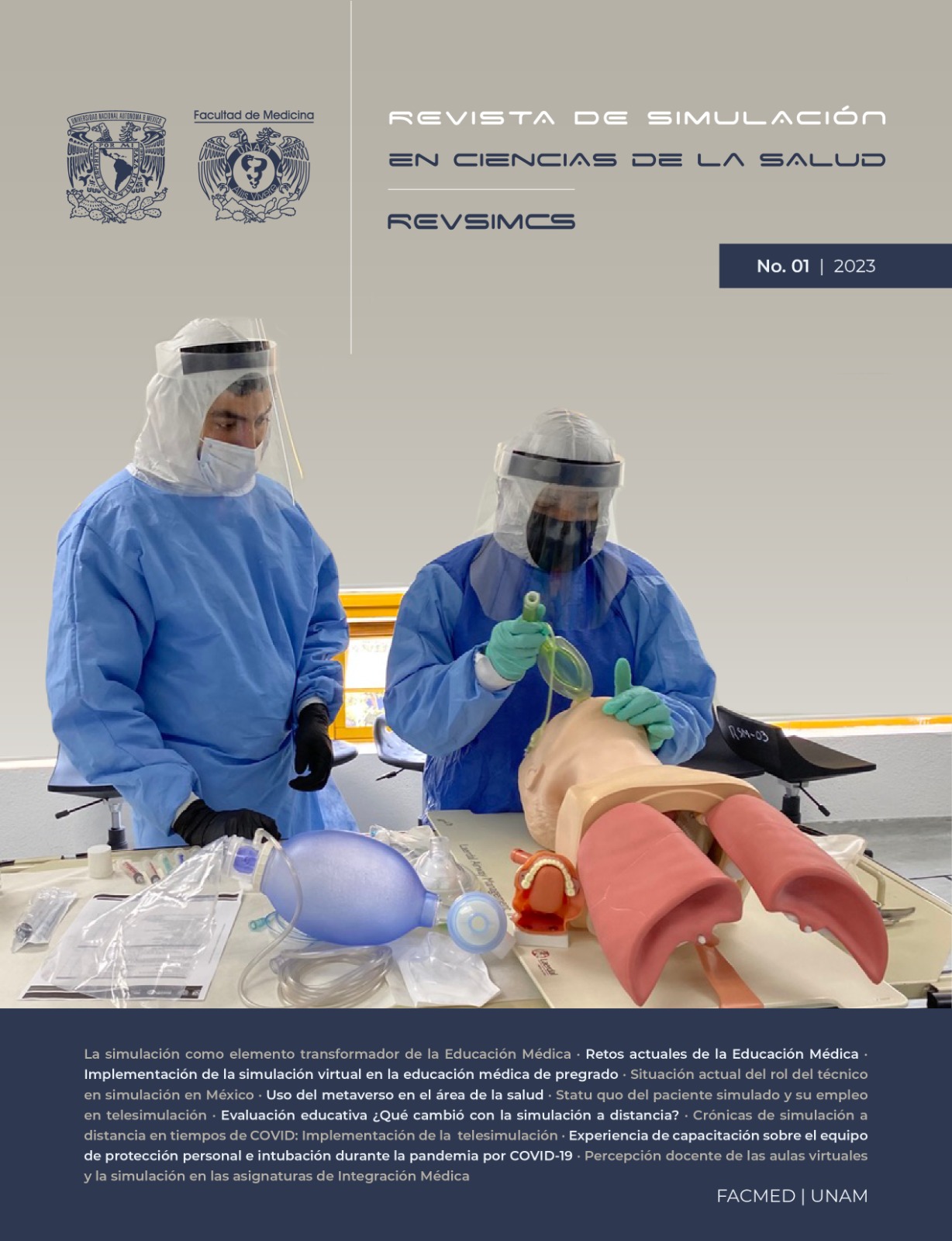Training experience on personal protective equipment and intubation during the COVID-19 pandemic
DOI:
https://doi.org/10.22201/fm.30617243e.2023.1.16Keywords:
COVID-19, Personal protective equipment, Intubation, Simulation training, EducationAbstract
Introduction. Given the fast spread of SARS-CoV-2 virus in Mexico and the presence
of severe cases of COVID-19; two courses were developed, the first, for the placement of personal protective equipment (EPP) and the second, for the intubation technique in the simulation Centre of the Department of Integration of Medical Sciences (DICiM) of the Medical School, National Autonomous University of Mexico (UNAM). Development. The courses were designed and implemented in a hybrid model, the theoretical part was online through Moodle and the participant’s training intubation
technique was practiced in the simulation Center; both parts were validated by national and international publications; and by specialist physicians. 14, 059 people participated in the courses. Discussion. While implementation of the courses, results were obtained likely as in national and international studies, but as an added value
to the participants, the delivery of a kit of personal protective equipment was done to each one, from a donation of the UNAM-BBVA Foundation, which encouraged them to treat patients with COVID-19 safely. Conclusions. Simulation is an educational strategy that allows to develop skills in a safe way and minimizing the risk of contagion.
References
Castro, M. R. (2020). La educación médica en tiempos del covid-19. Revista Médica Herediana, 31(3),143-147. ISSN: 1018-130X. https://www.redalyc.org/articulo.oa?id=338064636001
Consejo de Salubridad General. (2020). ACUERDO por el que el Consejo de Salubridad General reconoce la epidemia de enfermedad por el virus SARS-CoV2 (COVID-19) en México, como una enfermedad grave de atención prioritaria, así como se establecen las actividades de preparación y respuesta ante dicha epidemia. Diario Oficial de la Federación.
Harder, N. (2020). Simulation Amid the COVID-19 Pandemic, Clinical Simulation in Nursing, 43, 1-2, ISSN 1876-1399, https://doi.org/10.1016/j.ecns.2020.03.010
Liu, C. H., y You-Hsien Lin, H. (2021). The impact of COVID-19 on medical education: Experiences from one medical university in Taiwan. Journal of the Formosan Medical Association, 120(9), 1782–1784. https://doi.org/10.1016/j.jfma.2021.02.016
Minissian, M. B., Ballar, J., Coleman, B., et al. (2020). Multispecialty Nursing During COVID-19: Lessons Learned in Southern California. Nurse Leader. https://doi.org/10.1016/j.mnl.2020.08.013
Pan, D., & Rajwani, K. (2021). Implementation of Simulation Training During the COVID-19 Pandemic: A New York Hospital Experience. Simulation in healthcare : journal of the Society for Simulation in Healthcare, 16(1), 46–51. https://doi.org/10.1097/SIH.0000000000000535
Sánchez, J. A. (2020). Medical education in pandemic time: The case of coronavirus disease 2019 (COVID-19). Educacion Medica, 21(4), 259–260. https://doi.org/10.1016/j.edumed.2020.05.005
Thomas, A., Burns, R., Sanseau, E., & Auerbach, M. (2021). Tips for Conducting Telesimulation-Based Medical Education. 13(1), 1-6. https://doi.org/10.7759/cureus.12479
Weissman, G., Arrighi, J. A., Botkin, N. F., et al. (2020). The Impact of COVID-19 on Cardiovascular Training Programs: Challenges, Responsibilities, and Opportunities. Journal of the American College of Cardiology, 76(7), 867–870. https://doi.org/10.1016/j.jacc.2020.06.026
Vera, M., et al. (2021). Implementation of Distance-Based Simulation Training Programs for Healthcare Professionals. 00(00), 1-6. https://doi.org/10.1097/SIH.0000000000000550



